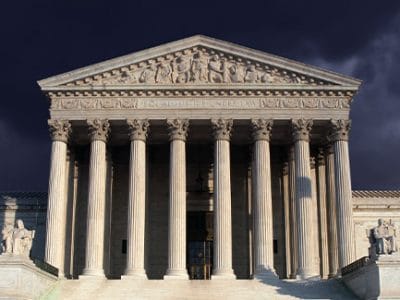Editor’s Note: The “V&V Q&A” is an e-publication from the Center for Vision & Values at Grove City College. Each issue will present an interview with an intriguing thinker or opinion-maker that we hope will prove illuminating to readers everywhere. In this latest edition, Dr. Paul Kengor, the executive director of the Center for Vision & Values, interviews Dr. Earl Tilford, a Grove City College professor, a military expert and historian, a war veteran, and a contributor to the upcoming April 10-11 conference, “Church & State in 2008,” to be held on the campus of Grove City College. This is part two of a two-part interview with Dr. Tilford.
V&V: Dr. Tilford, in part one of this two-part interview we focused on war, foreign policy, and the religious left . Let’s pick up on that theme. In instances like the war in Iraq, the Christian left quickly retreats to a defense of “Jesus was the Prince of Peace,” or “Jesus would never support war.” That said, nearly every president, whether a Christian Democrat or Christian Republican, has sent troops into battle. This includes Christian Democrats like Bill Clinton, Jimmy Carter, Lyndon Johnson, John Kennedy, Harry Truman, FDR, and Woodrow Wilson—i.e., all of them. Is the religious left consistent in its opposition to war? In other words, was the religious left as hard on Bill Clinton for the Balkans or FDR for WWII as it has been on Bush for Iraq?
Dr. Earl Tilford: The Christian left tended to ignore Bill Clinton’s actions in the Balkans, perhaps in part because U.S. policy supported Muslim victims against draconian Serbian Christian elements avowedly seeking to ethnically cleanse the Balkans of its Albanian Kosovar (Muslim) minority. President Clinton also carried out the war in a way that was seemingly pristine. For most people, images of bombs hitting targets from 15,000 feet are more akin to a video game. Had Clinton done what was truly necessary to stop the carnage, like put in ground forces, those images of war would have been much more galling. Clinton made “politically correct” war, so the left didn’t have to react adversely. It also wasn’t all that effective.
During World War II, only a small minority of traditional pacifists refused military service. The nature of the enemy in World War II was very different and America was also different. The religious left offered substantial opposition to the Vietnam War during the Johnson administration and did so quite adamantly while (on the plus side) simultaneously supporting Lyndon Johnson’s initiatives on civil rights. The “gray beards” of the current anti-war movement earned their spurs in the Vietnam-era anti-war movement.
V&V: Many of these religious left groups have made an almost seamless transition from protesting American policy during the Cold War to protesting American policy during the War on Terror. Which groups appear to have made that shift? The World Council of Churches? The National Council of Churches? Others?
Tilford: To varying degrees, they all have. Since the mid-1960s—the beginning of the Vietnam anti-war movement—members of the religious left skewed toward the political left. As their religious commitment to doctrinal and theological certainties decreased, they substituted faith for various social and political causes, like the Civil Rights movement of the 1960s and the anti-war movements of the 1960s and since 9/11. In both eras, the religious left’s focus has been on “America as behemoth.”
V&V: We need to emphasize that these groups were (are) not necessarily pro-communist or pro-Islamist. Yet, often they have unwittingly, unintentionally supported the bad intentions of the other side. Do you agree?
Tilford: The religious left calls itself “progressive.” Every communist was or is a progressive, even if not all progressives are communists. Saddam Hussein was a fascist dictator. There are elements of fascism in Islamic fundamentalism. Religious progressives are not so much “pro-fascist” or “pro-Islamist” as they are hyper-critical of American society and culture. The multi-cultural inclinations of these religious progressives make them as susceptible to accepting the criticisms leveled against American culture by the Islamist propaganda machine as they were by the Soviet propaganda machine. From Stalin to Ahmadinejad, our enemies are depending on them to be what Vladimir Lenin called “useful idiots.”
V&V: Generally speaking, the Christian left is often accused by the Christian right of being anti-Israel because of its alleged pro-Palestinian sympathies. Is that a fair charge?
Tilford: I think it is entirely fair. In my view, groups like Presbyterian Peacemaking, the Holy Land Christian Ecumenical Foundation, and Christian Peacemaker Teams consistently take a pro-Palestinian and anti-Israeli stance. So does the leadership of the mainline Protestant denominations.
V&V: You not only write about these individuals but have courageously gone to their conferences to engage them in dialogue. Have they been receptive to your presence?
Tilford: I appeared one time on a panel sponsored by the very fair and evenly balanced Institute for Christian-Jewish Understanding at Muhlenberg College back in November 2006. On that occasion I presented a paper on the previous summer’s fighting between Israel and Hezbollah. The two critics of my paper attacked me for using “the language of violence” in my paper. Well, the paper was about military action. They were respectful enough. The audience, consisting heavily of Jews, was very friendly.
The religious left, very much like the religious right, tends to hold conferences which are self-affirming and non-permissive of differing points of view. Both right and left are guilty of this. The American academic tradition is to consider and assess all points of view.
V&V: Do they agree to disagree? Are they charitable to you?
Tilford: I’ll give you just one example to answer your question. A few years back, after I criticized the Christian Peacemaker Teams some of their sympathizers sent emails to a number of my colleagues urging them to disavow me or get me fired. But then, on occasion, representatives from the Christian right have written urging the same thing. Narrow-mindedness, from whatever quarter, has no place in the American academic tradition. I condemn censorship and any other form of restraint on academic freedom.
V&V: Dr. Tilford, thanks for talking to us.
Tilford: Thank you.





Pingback: HZ » Air Power’s Siren Song